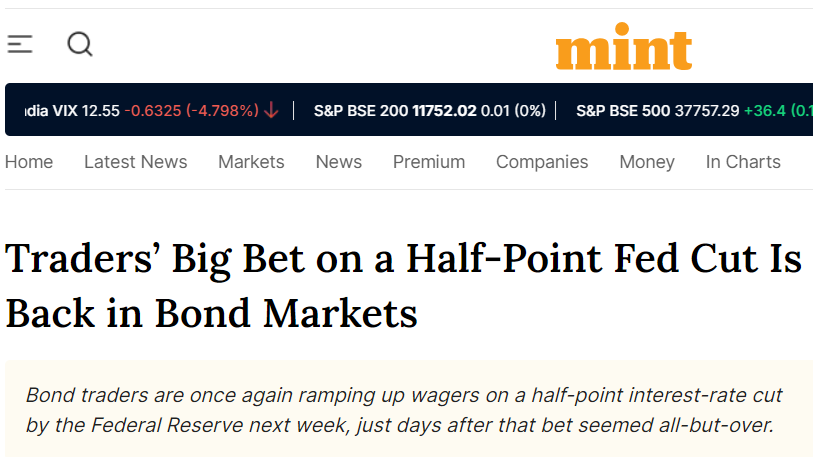Traders in the U.S. bond market are making substantial bets that the Federal Reserve will soon need to implement significant rate cuts, possibly as large as half a percentage point, to stave off a looming economic slowdown. This shift in sentiment follows recent economic data, including weaker-than-expected job growth and rising unemployment, which have intensified fears of a recession.
The bond market has responded with a surge in Treasury prices, especially for shorter-term securities like the two-year note, whose yields dropped significantly—indicating traders expect the Fed to ease monetary policy aggressively. As the Fed’s benchmark rate hovers around 5.3%, the yield on the two-year Treasury has fallen below 3.9%, a notable gap that reflects growing recession concerns. Some analysts believe that traders may be overreacting, as they have in the past, and further economic data is needed to validate this pessimism.
This growing anticipation of Fed rate cuts is also influencing broader financial markets, with stock indices declining and concerns rising about a hard landing. Economists from firms like JPMorgan and Citigroup are forecasting that the Fed might lower rates by 50 basis points in its upcoming meetings if economic conditions continue to weaken.
The recent news about traders betting on a Federal Reserve rate cut has significant implications for everyday individuals. Here’s why it matters and how it affects their daily lives:
1. Impact on Borrowing Costs
When the Federal Reserve cuts interest rates, it typically leads to lower borrowing costs for individuals. This includes mortgage rates, car loans, and credit card interest rates. If the Fed cuts rates as traders predict, homeowners may see cheaper mortgage rates, and consumers can benefit from lower interest on loans and credit .
Lower interest rates make borrowing more affordable, potentially increasing spending on housing, cars, or other large purchases. However, it also means those saving money in bank accounts might see lower returns on their savings.
2. Inflation and Price Stability
If the Fed reduces rates too aggressively, it could lead to inflationary pressure. While this helps borrowers, higher inflation can reduce the purchasing power of consumers, making day-to-day goods and services more expensive. This is particularly concerning in an environment where inflation has already been high .
3. Job Market and Wages
Rate cuts are often intended to stimulate economic growth and prevent unemployment from rising. If the Fed cuts rates, it may help avoid a deep economic downturn and protect jobs, especially in sectors sensitive to interest rates, such as housing and manufacturing . However, if inflation rises as a result, wage growth may not keep up with the increasing cost of living, squeezing household budgets.
4. Investment and Retirement Savings
Lower interest rates can benefit stock markets in the short term as borrowing becomes cheaper for businesses, potentially boosting corporate profits. This could lead to a rise in stock prices, which benefits individual investors and those with retirement accounts. However, bond yields generally fall when rates are cut, reducing returns on safer investments like Treasury bonds .
For retirees or individuals nearing retirement, lower bond yields mean that they may earn less from fixed-income investments, potentially impacting retirement plans.
5. Housing Market
For homeowners or potential buyers, lower rates often mean cheaper mortgages. This can make homeownership more affordable for new buyers and allow existing homeowners to refinance at lower rates, freeing up disposable income. On the flip side, lower mortgage rates can also drive up demand for housing, which may increase property prices, making it harder for first-time buyers .
In summary, this news is crucial for ordinary people because interest rate changes by the Fed can directly influence their borrowing costs, savings, job prospects, and inflation, affecting both short-term financial decisions and long-term economic well-being .
References
- NerdWallet: Finance smarter
- Investopedia on inflation and rate cuts.
- Traders’ Big Bet on a Half-Point Fed Cut Is Back in Bond Markets
- Treasuries Surge as Traders Bet Big on a Fed Rescue Mode



